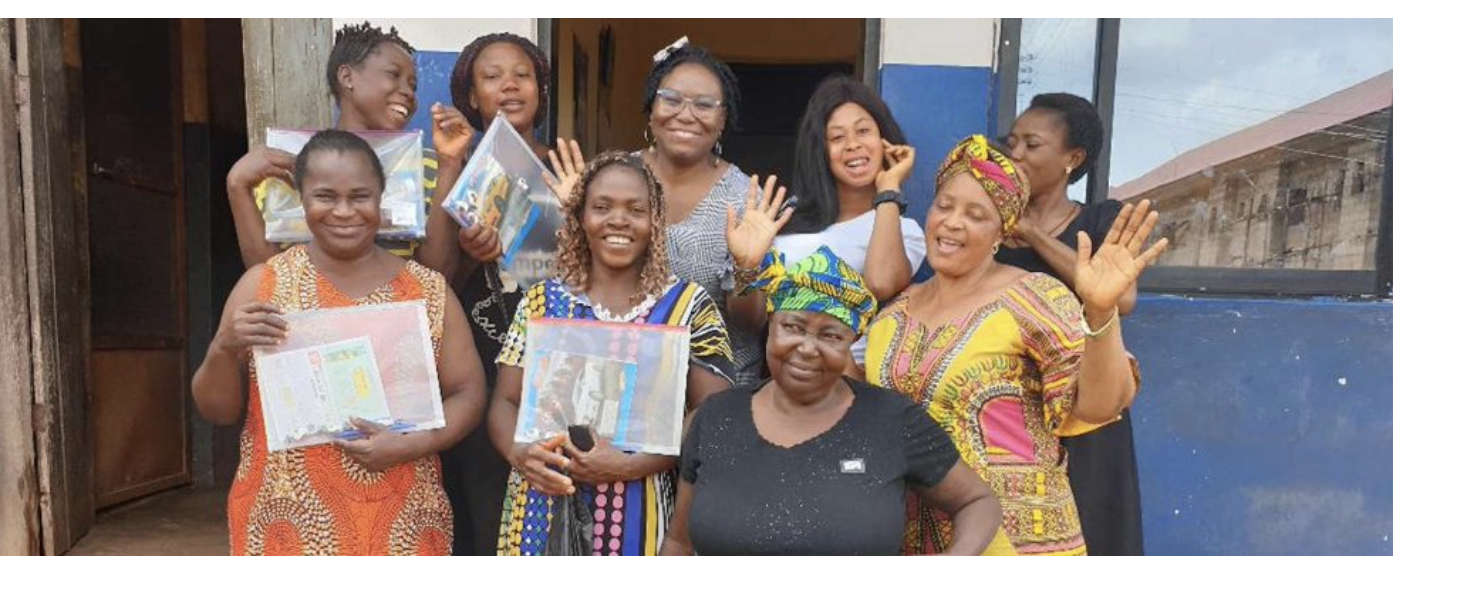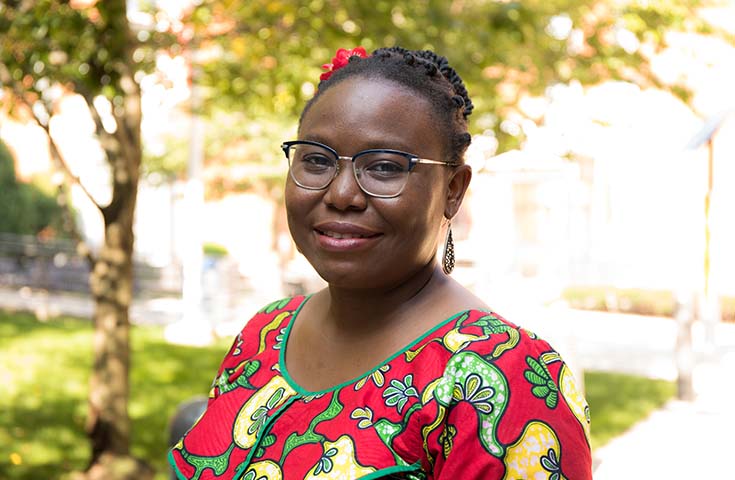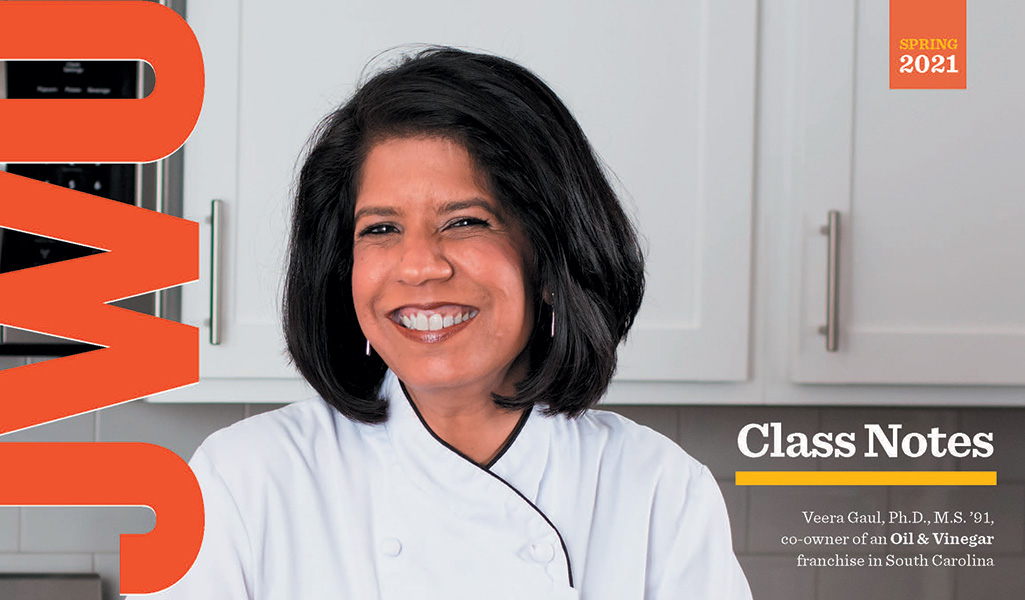Professor Ezenwayi Amaechi '07 MBA, helps women and youth become successful entrepreneurs at home and abroad.
“If money was no object, what would you want to do with your life?” That was the question posed to Ezenwayi Amaechi '07 MBA, during an informational interview with a small nonprofit before she joined the College of Business faculty at Johnson & Wales University.
She didn’t hesitate, “I’d travel the world and help women.”
Raised in Nigeria, Amaechi has “roots in developing nations” and grew up visiting the local outdoor markets. After returning to the United States and earning her MBA from JWU, she attended Walden University — an institution that emphasizes social change — for her doctorate. At Walden, her thoughts kept returning to the marketplaces and the resourceful women who made a living there. She decided to focus her dissertation on the research question: What are the barriers to women entrepreneurs in developing nations?
Amaechi returned to Nigeria to find out. In the Enugu State in the southeastern part of the country, Amaechi observed the hardworking women of the marketplaces. She remembers watching as one seller took money from a customer to immediately pass it into a helper’s hands without writing down the amount. After talking to the women, Amaechi learned that few had financial education or knew how to create a budget. Amaechi says, “I’d ask women how much they earned in a week, month or year, and they had no idea.”
“I told the women I’d return one day to help them figure it out. They didn’t believe I would come back,” she says with a laugh. “They thought I’d get my ‘fancy degree’ and forget all about them.”

Back Stateside, Amaechi’s dissertation laid out the barriers she witnessed for women in Nigeria, highlighting that while money is important, training is even more crucial. “Most women start these businesses out of necessity; they need to survive and take care of their families, so they become ‘accidental entrepreneurs.’ However, that means they get stuck in a cycle that doesn’t include learning and growing in their businesses. They don’t get training on financial literacy, customer service or marketing. Money is important, but if you don’t know how to use it, it’s not going to be meaningful.”
Upon graduation from her PhD program, Amaechi proved the marketplace women wrong. She hadn’t forgotten about them. The moment she had enough money to travel, she returned to Nigeria to provide business training for six weeks.
Twenty-two women showed up.
That was the beginning of the formal launch of her social enterprise, Microenterprise Social Entrepreneurship (MESE), to help activate sustainable entrepreneurship among women (and later youth) with trainings and micro-loans. She then added MESENow Institute, an online research-based training platform.
Often, we learn more from our failures than our successes. A big part of entrepreneurship is failing; so, fail fast, get back up and keep growing because you can do it.Ezenwayi Amaechi '07 MBA
“My personal experience and research show that when small-scale women entrepreneurs are empowered through financial literacy and other business training, and then, given access to finance — no matter how little — they can make a difference in their families, communities and country,” says Amaechi, who founded the organization in 2017. “As I conducted more research, I discovered that youth also need support, particularly in the startup phase, so I expanded my mission to include young people.”
Since the nonprofit launched, Amaechi has conducted trainings in six countries, including Ghana, South Africa and Mexico, and expanded her reach through the MESENow platform. She continues to work in Nigeria providing financial literacy trainings for women and youth and has established a train-the-trainer program to carry on with her work when she can’t be physically on the ground.
The women and youth sing her praises.
Rosemond, from Ghana, is a food seller whose demand for her cooking was greater than the amount of food she could make. A microloan from MESE helped her expand the business because she was able to purchase and add jollof and waakye (rice and beans) and feed more customers. Rosemond is one of 40 women MESE has supported in Ghana. Another is Sarah, a makeup artist, who couldn’t afford the fees to send her daughter to school. She says, “MESE’s microloan helped me procure all I needed in my salon for my work, which enabled me to financially support my child's education.”
Awal, a youth training recipient who runs a growing agricultural exports business, says Amaechi gave him “knowledge of business organization, reading and analyzing financial statements, record keeping and budgeting. Before taking part in the training, I used to find it difficult to perform these tasks, and I didn’t know the importance of performing them or the great impact it would make on our business. But Professor Amaechi granted me an opportunity to take part in this special training for free.”
Cultivating entrepreneurs at home
While educating women and youth abroad, Amaechi continues to cultivate young minds as a professor of entrepreneurship and the faculty consultant for JWU’s Larry Friedman Center for Entrepreneurship (eCenter).
Under the guidance of Amaechi, the eCenter brings together entrepreneurial studies, experiential opportunities, mentors and small business support services to transform students into entrepreneurs and their ideas into commercial or social enterprises. In her role as faculty consultant, Amaechi facilitates accelerator programs and reviews startup proposals from students.
In addition to serving as a hub for entrepreneurial resources and support, the e-enter hosts multiple events and programs each year, including the popular JWU SharkFest Competition based on the television show “Shark Tank.” The pitch competition tests the business acumen, creativity and ambition of JWU student entrepreneurs, who battle it out for monetary prizes. Amaechi helped organize the competition and served as a coach for one of the contestants.
Outside of JWU SharkFest, what does Amaechi look for in a student startup proposal? She wants to know how well student entrepreneurs understand the problem they are trying to solve and for whom they are trying to solve it. For her own nonprofit, Amaechi spent years abroad building relationships and understanding the experiences of the women and youth she hoped to serve.
“You have to be able to understand your audience and differentiate yourself in the marketplace. Students need to understand that their target audience cannot be everyone,” she says with a chuckle. This is the type of crucial information that students learn in her classes, including Introduction to Entrepreneurship, Pitching & Planning New Ventures, and Global Entrepreneurship.

Faculty Feature: Ezenwayi Amaechi, Ph.D.
When she's not in the classroom, she's consistently thinking of ways to practice what she preaches. As a social entrepreneur, Associate Professor Ezenwayi Amaechi has helped dozens of people and groups looking to build upon their business skills — in countries like Ghana, Nigeria, and the Dominican Republic.
Amaechi teaches both undergraduate and graduate classes, and she’s just as passionate about collaborating with students as she is about her endeavors abroad. She says, “I learn as much from my students as they do from me.”
Her students seem to find her unforgettable.
One such student is alum and successful entrepreneur Noah Rosen ’19. Rosen started his business, Forge To Table, while taking one of Amaechi’s classes. Forge To Table is a culinary supply company that produces handmade kitchen knives and utensils with steel sourced from Takefu, Japan. Now in its fifth year, Rosen’s business passed one million dollars in total revenue last year.
Rosen, who graduated with a double major in Culinary Arts and Food & Beverage Entrepreneurship, credits Amaechi as a powerful influence on his success. “Dr. Amaechi was such a mentor to me while in class, and when I started using the eCenter for assistance navigating the startup process,” he says. “During one of our first classes, she noticed my frantic typing. I showed her that I was not only taking notes, but also creating spreadsheets and business plans at the same time — putting her lessons directly into action for my business.” He adds, “Forge To Table even gained a European distribution partner through a connection made at the Entrepreneurship center.”
This year, Rosen plans to release two new accessory products while also scaling his Test Kitchen division. Sam Burgess '18, also a JWU alumni, and Maya Alderman '22, are heading that endeavor. Rosen says Burgess and Alderman will be “creating delicious, seasonal new recipes utilizing the Forge To Table tools to give customers something to keep coming back to.” The idea and concept for the Test Kitchen, says Rosen, was created as a result of Amaechi’s classes and mentorship.
Reflecting on his time at JWU, Rosen adds, “Her classes are by far the thing I miss the most. I’m grateful that even now, years out of JWU, I can still reach out to her — and often do — for advice.”
Amaechi says she’s always thrilled to hear from current and former students and is energized by mentoring JWU’s burgeoning entrepreneurs. She explains, “My goal is to bring what I learn as an entrepreneur myself into the classroom and the eCenter and help my students grow and become exemplary, productive members of the community who also help others.”
For Amaechi, it took years and multiple setbacks to build MESE, which is why her advice for aspiring entrepreneurs is: “Overnight success takes ten years.” She instructs students to embrace failure as part of the process: “Often, we learn more from our failures than our successes. A big part of entrepreneurship is failing; so, fail fast, get back up and keep growing because you can do it.”
If you wish to support entrepreneurial efforts at the College of Business visit:
Giving.jwu.edu